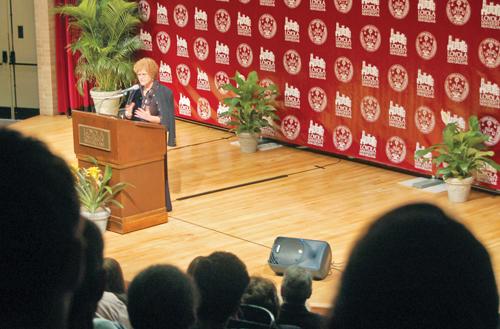On Nov. 5, a group of 25 students gathered in the J. Edgar and Louise S. Monroe Library Multimedia Room to hear researcher Geoffrey Megargee lecture on the Holocaust.
Cameron Sasnett, political science freshman, said the best part about these lectures is that “they are like show-and-tell. You get a field trip when you attend lectures like this one.”
Megargee, a scholar from the United States Memorial Holocaust Museum, delivered a historical account of the Holocaust and the different criminal activities that took place.
Megargee said it’s important to give lectures about the Holocaust on college campuses because students should know as much as they can about it. “There’s a mix when it comes to student perceptions about the Holocaust. It all depends on the individual,” Megargee said. He knows that there are many students that understand what happened, but at the same time, there are many misperceptions, even those who deny the Holocaust happened.
“I believe that most who deny the Holocaust are anti-Semitic simply because there is an overwhelming amount of evidence proving it really happened, while others are people in Germany who simply don’t want to accept that their society was capable of such a thing,” Megargee said.
Bernard Cook, a history professor at Loyola, said he decided to organize the event after visiting the national museum. Megargee was already going to be in New Orleans to meet with the Board of Directors of the World Ward II Museum, and Cook jumped at the opportunity for a Loyola visit.
Cook said the lecture would give students a look at what happened during the Holocaust.
“I don’t know that they have a very precise idea of what happened. They know about the anti-Jewish, the genocide, but it’s more of a revulsion. I’m not sure that they know that many particulars or the details,” Cook said.
According to Cook, the purpose of this lecture was to explain the origins of the Holocaust and the relationship with racism and the Nazi party. “It’s important for them to understand how individuals in a regime could reach the point where they were able to categorize other human beings as less than human,” Cook said.
For Cook, it’s important that students have a clear understanding of the Holocaust. “I think people don’t understand the power of racism and of categorizing other people as different, and that could lead them to create stereotypes where they regard other people as inferior,” Cook said.
The recent U.S. election, which elected Barack Obama as the first black president, is a positive sign, according to Cook. “I think that racism still exists in America, but not as strong, where some people were afraid that whites would not vote for an African-American. The election has proven that many whites were willing to vote for any person no matter what race the person was, because they thought he was the best candidate,” Cook said.
“I was interested in learning about the overall guilt that the army officers had and that played a part in the Holocaust,” Camerson Sasnett, a political science freshman who attended the lecture, said.
He said he believes lectures like this one are important. “They give a different insight than your professor and because your selection of courses are kind of limited,” Sasnett said.
Eduardo Gonzalez can be reached at ejgonzal@loyno.edu.






